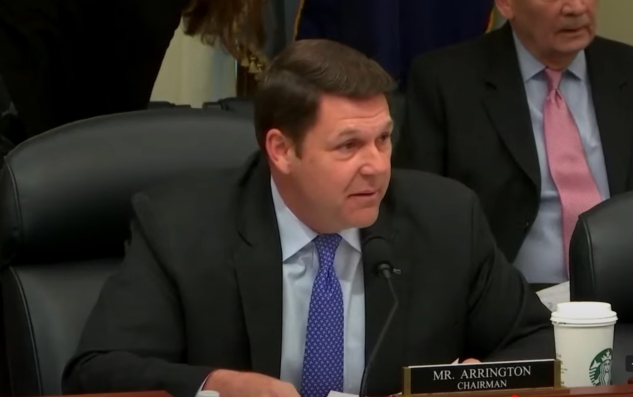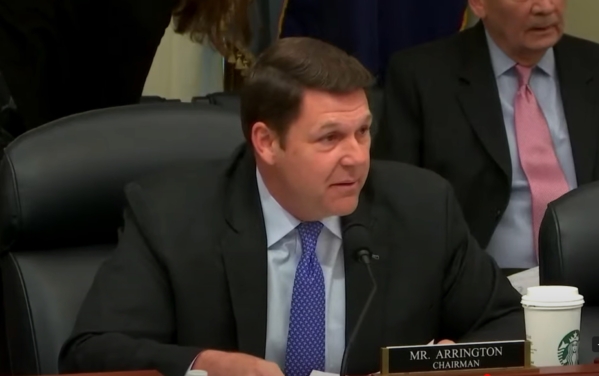NCPSSM “Tremendously Disappointed” by House Budget Committee Vote

Rep. Jody Arrington (R-TX) chairs the House Budget Committee
The National Committee to Preserve Social Security and Medicare is tremendously disappointed in the House Budget Committee’s vote to favorably report the Fiscal Commission Act of 2023 out of committee. This is the final step in the legislative process before the bill comes to the House floor for a vote.
“A fiscal commission is designed to give individual members of Congress political cover for cutting Americans’ earned benefits. Any changes to Social Security and Medicare should go through regular order and not be relegated to a commission unaccountable to the public and rushed through the Congress. This bill should be opposed by any member of Congress who cares about Social Security, Medicare, and the constituents who depend on them. – Max Richtman, president and CEO, National Committee to Preserve Social Security and Medicare
This bill is designed to rush the Commission’s recommendations, which would inevitably prioritize deep cuts to Social Security and Medicare, through Congress so they can be enacted before the American people have a chance to study them and understand how they would be affected. The bill’s goal of avoiding political accountability is made clear as H.R. 5779 prohibits the issuance of the Commission’s recommendations prior to election day and provides that the ensuing legislation would come to the floor during the lame-duck Congress. In this scenario, representatives who are leaving Congress at the end of the year could vote to cut American’s earned benefits — without having to face voters again.
NCPSSM believes that Social Security and Medicare should be reformed. But the process must be deliberative and fully accessible to the public. The committees with jurisdiction over Social Security and Medicare should hold hearings, develop legislation that improves – not cuts – benefits. The future of these critical programs must not and should not be determined as part of a budget cutting exercise.
Members of Congress should understand that fiscal commissions that force changes to Americans’ hard-earned benefits will – and should not – fool the voters. President Biden has rightly called such commissions “death panels” for Social Security and Medicare. We urge all House members who claim to champion these vital programs for seniors to reject the Fiscal Commission Act.
Congress Shouldn’t Enact “Death Panels” for Social Security & Medicare



NCPSSM sent a letter to Congress today urging representatives to reject the Fiscal Commission Act of 2023. This bill would establish a commission that would circumvent Congress’ regular order for considering Social Security and Medicare changes. The bill will be marked up in the House Budget Committee on January 18.
Commissions of this kind are intended to squeeze every possible dollar of savings out of Social Security and Medicare without consideration for the adequacy of benefits during their deliberations. They are intended as a maneuver for enacting deep cuts to these critical programs that could never pass Congress through the normal legislative process because of their unpopularity with the voting public.
“A fiscal commission is designed to give individual members of Congress political cover for cutting Americans’ earned benefits. Any changes to Social Security and Medicare should go through regular order and not be relegated to a commission unaccountable to the public and rushed through the Congress.” – Max Richtman, president and CEO, National Committee to Preserve Social Security and Medicare
This bill is designed to rush the Commission’s recommendations, which would inevitably prioritize deep cuts to Social Security and Medicare, through Congress so they can be enacted before the American people have a chance to study them and understand how they would be affected. The bill’s goal of avoiding political accountability is made clear as H.R. 5779 prohibits the issuance of the Commission’s recommendations prior to election day and provides that the ensuing legislation would come to the floor during the lame-duck Congress. In this scenario, representatives who are leaving Congress at the end of the year could vote to cut American’s earned benefits — without having to face voters again.
NCPSSM believes that Social Security and Medicare should be reformed. But the process must be deliberative and fully accessible to the public. The committees with jurisdiction over Social Security and Medicare should hold hearings, develop legislation that improves – not cuts – benefits. The future of these critical programs must not and should not be determined as part of a budget cutting exercise.
Members of Congress should understand that fiscal commissions that force changes to Americans’ hard-earned benefits will – and should not – fool the voters. President Biden has rightly called such commissions “death panels” for Social Security and Medicare. As NCPSSM’s president and CEO, Max Richtman, said, “The Fiscal Commission Act of 2023 should not have a mark-up, come to the floor for a vote, or, frankly, see the light of day.”
NCPSSM Endorses Tim Kaine for Re-election to U.S. Senate



On behalf of our 28,000 members and supporters in Virginia, the National Committee to Preserve Social Security and Medicare today proudly endorsed Tim Kaine for re-election to the U.S. Senate in Fredericksburg, VA on Friday. Senator Kaine has proven himself time and again as a leader on issues affecting Virginia seniors. He earns a 100% rating on our legislative scorecard for his steadfast championing of Social Security, Medicare, and lower prescription drug prices.
“I have known Tim Kaine for over 15 years now, and I have been consistently impressed by his commitment to working families and seniors. He has always been close to his own elderly parents — and understands the importance of retirement and health security for all Virginia families. Underpinning all of this are the values of hard work, fairness, and family that he has demonstrated so well during his first two terms in Washington.” – Max Richtman, President and CEO, National Committee to Preserve Social Security and Medicare
Senator Kaine accepted NCPSSM’s endorsement Friday morning at a town hall at Chancellor’s Village, a senior living facility in Fredericksburg. National Committee president and CEO Max Richtman handed the Senator a pair of NCPSSM’s signature boxing gloves to recognize his championing of seniors.
“I’m honored to receive the endorsement of the National Committee to Preserve Social Security and Medicare because I am determined to stand up for Virginia seniors and lower costs. Virginians should have access to affordable health care and be able to retire with dignity – which has been and will continue to be my priority in the U.S. Senate.” – Senator Tim Kaine
Virginians can continue to count on Senator Kaine to protect their hard-earned benefits. There are some 1.6 million Social Security beneficiaries in Virginia. The average benefit for Virginia retirees is nearly $1,900 per month, or about $23,000 a year. Senator Kaine knows that Virginians living on fixed incomes cannot afford cuts to their hard-earned benefits, which key Republicans (including contenders for the GOP presidential nomination) have proposed.



Senator Kaine greets supporters at town hall event in Fredericksburg, VA
Senator Kaine also will continue to fight prescription drug price gouging by Big Pharma, as he has during the 118th Congress. He supported the Inflation Reduction Act, which finally allows Medicare to negotiate drug prices with pharmaceutical companies — and caps seniors’ out-of-pocket drug costs under Medicare Part D at $2,000 per year. Virginians are now beginning to see those benefits realized, including a $35 cap on monthly insulin costs.
The Inflation Reduction Act passed the Senate by one vote. Without the vote of Senator Kaine, Virginians would not have the benefits of this historic drug pricing reform. There is plenty more work to be done in the next Congress — and that is why we need Tim Kaine in the Senate to fight for older Virginians and their families.
FDR Would Be “Fighting Mad” About Assaults on Social Security, Says Grandson on New Podcast



President Franklin D. Roosevelt would be “fighting mad” about conservative attempts to undermine Social Security, says his grandson, Jim Roosevelt on the first episode of our new podcast — released this week. Roosevelt says that FDR would not only be mad. “We’d see him actively pressuring Congress” to support Social Security — and working to elect lawmakers who champion his legacy program — in the face of myriad proposals to cut and privatize it.
The podcast, “You Earned This,” debuted on multiple platforms — including Spotify, Apple Podcasts, and Amazon/Audible. It is available to listen and download for free. Each episode covers a single topic with a single guest. Because we know that listeners have a limited amount of time, this podcast is designed to be “bite-sized.” Episodes are no longer than 15 minutes each, making for a brisk and brief listening experience!
In this episode, Jim Roosevelt says that the Social Security Administration (SSA), which is responsible for administering benefits for 71 million people, cannot be expected to service the public properly without adequate funding. Customers have experienced long wait times on the 800 phone line, field office closures, and extended delays in adjudication of disability claims hearings — all due to a 17% cut (adjusted for inflation) in operating budget since Tea Party Republicans took control of the House beginning in 2011.
“First of all the budget cuts that took place at the time of the Tea Party really devastated the workforce. (Employee morale has suffered) because if you tell people you have this huge amount of work to do and we’re not going to give you anybody to help you do it, they get very dissatisfied.”
Roosevelt expressed optimism that the putative new SSA Commissioner, former Maryland Governor Martin O’Malley, would advocate for more funding and make other improvements to shore up customer service. O’Malley is expected to be confirmed by the full Senate on December 18th.
Roosevelt criticizes Republicans who propose to raise the retirement age for Social Security to 69 or 70, including presidential candidate, Nikki Haley. Roosevelt says her intention to cut benefits for people now in their 20s and 30s — including her adult children — is plain “crazy.”
“Our kids (are) not going to have a lower cost of living than retirees do today. Social Security already is an adequate benefit, but not a generous benefit. In fact, if anything, it should be increased, not cut for future generations.” – Jim Roosevelt, 12/14/23
He also rails against Republican proposals for a fiscal commission to decide the fate of Social Security (and Medicare), including House Speaker Mike Johnson’s pledge to create such a commission. Those commissions, Roosevelt tells us, are “a black box” designed to let individual lawmakers off the hook for proposing to cut seniors’ earned benefits.
He also reminisced about conversations he had as a teenager with grandmother, Eleanor Roosevelt. (Jim Roosevelt was born after his grandfather, FDR, passed away.) He describes the former first lady as a passionate advocate for women’s rights, including women’s retirement security. Eleanor, he says, was equally dedicated to preserving Social Security so that, in the words of FDR, “no damn politician” could ever take it away.
Our next guest is NCPSSM senior health policy expert, Anne Montgomery, breaking down the Disadvantages of Medicare Advantage. That episode will be released on December 21st!
To listen to the “You Earned This” podcast, click here.
Sorry, Slate Magazine, We Don’t Need to ‘Radically Rethink’ Social Security



Conservative think tanks and publications have been very busy pumping out propaganda designed to undermine Social Security. Of course, the conservative movement has been working to weaken or eliminate the program since the 1980s, and its messaging seeps quite seamlessly into the mainstream media narrative about Social Security. A recent opinion piece in Slate magazine is the latest example of anti-Social Security propaganda from the political right. The unsubtly titled piece, Social Security Doesn’t Make Sense Anymore, is technically co-authored by Eric Boehm and Celeste Headlee, but it is mainly a transcript of an interview with Boehm on Headlee’s Slate podcast. Boehm is a reporter for the conservative magazine, Reason, who has praised Argentina’s new MAGA-like president, Javier Milei, as a champion of ‘smaller government.’
The Slate article is so rife with misleading statements that it’s hard to know where to begin correcting it. L.A. Times’ columnist Michael Hiltzik counted at least 30 such statements. We can’t even begin to rebut all of them in one Equal Time blog post. But we will correct some of the worst zingers (below), in hopes that by removing enough cards from the unstable house that the Slate authors built, the whole thing will rightfully come tumbling down.
MISLEADING STATEMENT: “Social Security is a transfer of wealth from people who are young and working and productive, because it’s funded with payroll taxes.” – Slate
Social Security is not a federal transfer program. Transfer programs are funded by general tax revenue and tend to be one-way transactions, usually from wealthier to poorer groups (e.g., Medicaid, food stamps). Social Security payroll taxes are a dedicated income stream that can only be used for payment of Social Security benefits. Workers paying into Social Security are earning the right to collect benefits later — when they retire or become disabled.
MISLEADING STATEMENT: “Retirees are generally wealthier than the people who are funding their retirements through Social Security. So… we need a radical rethink of the program.” – Slate
While some retirees are well-off (Older billionaires like Warren Buffet skew the average), forty percent of seniors depend on Social Security for all their income. Ten percent of American seniors already live in poverty. Without Social Security, half of retirees would fall beneath the poverty line. Younger workers pay into the system in return for collecting benefits when they retire. This intergenerational compact has worked for nearly ninety years and there is no need to ‘radically rethink’ it now.
MISLEADING STATEMENT: “I’d love to reframe this debate away from the idea that those of us who are proposing reforms are somehow breaking a promise that was made to retirees.” – Slate
Of course Social Security is a promise — from the federal government to American workers, dating back to the enactment of the program in 1935. President Franklin D. Roosevelt pledged that Social Security would “give some measure of protection to the average citizen and family against poverty-ridden old age.” This is why, nearly 90 years later, President Biden referred to Social Security as a “sacred trust.” The fundamental promise is that when workers pay into the system, they are eligible for retirement benefits later.
MISLEADING STATEMENT: “That promise has been upended by decades of greater prosperity for Americans.” – Slate
While it’s true that fewer seniors are living in poverty than in 1935 – at the height of the Great Depression – prosperity is not equitably shared in 21st century America. Income inequality has mushroomed in the past 40 years. As Bloomberg reported, “middle class financial security has eroded in past decades.” In fact, as of 2021, the top 1% of U.S. earners now hold more wealth than all of the middle class. This includes millions of middle class seniors, Warren Buffett notwithstanding. Seniors need Social Security just as much as they did in 1935 — if not more.
MISLEADING STATEMENT: “(Social Security is) going to hit a brick wall in the 2030s.” – Slate
The Social Security Trustees project that the program’s trust fund will become depleted in 2034, without corrective action from Congress. Even if the trust fund does run dry, Social Security still could pay some 80% of benefits. So the program will not “hit a brick wall” and suddenly stop. That would only happen if we had 100% unemployment and no one was contributing payroll taxes. Congress can solve the trust fund shortfall largely by adjusting the payroll wage cap so that the wealthy begin paying their fair share into Social Security.
MISLEADING STATEMENT: “We have to borrow more money to pay Social Security benefits.” – Slate
First of all, Social Security is not legally allowed to borrow money. In fact, it provides the federal government with money because the trust fund is held in special Treasury notes. As we said above, the projected shortfall in the trust fund could be addressed by ensuring that high earners are contributing their fair share. Forty years ago, some 90% of eligible income was subject to Social Security payroll taxes. Thanks to rising income inequality (the rich getting richer while the rest tread water), today only about 80% of all eligible income goes toward Social Security payroll contributions, depriving the system of much-needed revenue. It’s time to correct that.
MISLEADING STATEMENT: “There’s not enough money to go around. So who gets paid first? Do we pay wealthy retirees first? Or do we pay needy working-class families and single moms with kids first? If you’re gonna pay wealthy seniors first, it means everything else has to go.” – Slate
First of all, Social Security benefits are progressive. Lower income retires receive proportionally higher benefits than wealthier ones do. Furthermore, eliminating Social Security benefits for higher earners wouldn’t significantly improve Social Security’s finances. Congress would have to slash benefits for the middle class, too, in order to have any impact on the bottom line.
In reality, if conservatives truly are concerned about “needy working-class families and single moms with kids,” they might want to rethink their crusade to slash federal safety net programs for those very people, including Medicaid, food stamps, or Temporary Assistance for Needy Families (TANF), to name a few. But then conservatives might have to let go out of those deficit-swelling Trump tax cuts that benefitted the wealthy and big corporations — along with corporate welfare and unchecked military spending. Blaming Social Security for the lack of spending on other segments of society is a huge red herring.
MISLEADING STATEMENT: “Life expectancy is more than 15 years higher now than when Social Security began.” – Slate
According to L.A. Times columnist Michael Hiltzik, Boehm’s life expectancy figures are misleading. Life expectancy in 1935 was about 63 years, but that figure was skewed by a high infant mortality rate at the time, when many children did not live beyond one year of age. “For Americans who made it to their first birthday back then, average life expectancy was nearly 66,” writes Hiltzik. “For those entering their working careers, say at age 20 — it was nearly 69.” With this analysis, Hiltzik takes the air of out Boehm’s argument that people were never intended to collect Social Security into their late 60s because they supposedly weren’t living that long.
Furthermore, while average life expectancy has increased since the 1930’s, life expectancy for some demographics is lagging behind. And even if some Americans are living longer than they did in 1935, that doesn’t mean they can continue working into their late 60s, which many conservatives demand by proposing to raise the Social Security retirement age.
**********************************************************************************************************************
For accurate information about Social Security, please visit ssa.gov and https://www.ncpssm.org/our-issues/social-security/
NCPSSM “Tremendously Disappointed” by House Budget Committee Vote



Rep. Jody Arrington (R-TX) chairs the House Budget Committee
The National Committee to Preserve Social Security and Medicare is tremendously disappointed in the House Budget Committee’s vote to favorably report the Fiscal Commission Act of 2023 out of committee. This is the final step in the legislative process before the bill comes to the House floor for a vote.
“A fiscal commission is designed to give individual members of Congress political cover for cutting Americans’ earned benefits. Any changes to Social Security and Medicare should go through regular order and not be relegated to a commission unaccountable to the public and rushed through the Congress. This bill should be opposed by any member of Congress who cares about Social Security, Medicare, and the constituents who depend on them. – Max Richtman, president and CEO, National Committee to Preserve Social Security and Medicare
This bill is designed to rush the Commission’s recommendations, which would inevitably prioritize deep cuts to Social Security and Medicare, through Congress so they can be enacted before the American people have a chance to study them and understand how they would be affected. The bill’s goal of avoiding political accountability is made clear as H.R. 5779 prohibits the issuance of the Commission’s recommendations prior to election day and provides that the ensuing legislation would come to the floor during the lame-duck Congress. In this scenario, representatives who are leaving Congress at the end of the year could vote to cut American’s earned benefits — without having to face voters again.
NCPSSM believes that Social Security and Medicare should be reformed. But the process must be deliberative and fully accessible to the public. The committees with jurisdiction over Social Security and Medicare should hold hearings, develop legislation that improves – not cuts – benefits. The future of these critical programs must not and should not be determined as part of a budget cutting exercise.
Members of Congress should understand that fiscal commissions that force changes to Americans’ hard-earned benefits will – and should not – fool the voters. President Biden has rightly called such commissions “death panels” for Social Security and Medicare. We urge all House members who claim to champion these vital programs for seniors to reject the Fiscal Commission Act.
Congress Shouldn’t Enact “Death Panels” for Social Security & Medicare



NCPSSM sent a letter to Congress today urging representatives to reject the Fiscal Commission Act of 2023. This bill would establish a commission that would circumvent Congress’ regular order for considering Social Security and Medicare changes. The bill will be marked up in the House Budget Committee on January 18.
Commissions of this kind are intended to squeeze every possible dollar of savings out of Social Security and Medicare without consideration for the adequacy of benefits during their deliberations. They are intended as a maneuver for enacting deep cuts to these critical programs that could never pass Congress through the normal legislative process because of their unpopularity with the voting public.
“A fiscal commission is designed to give individual members of Congress political cover for cutting Americans’ earned benefits. Any changes to Social Security and Medicare should go through regular order and not be relegated to a commission unaccountable to the public and rushed through the Congress.” – Max Richtman, president and CEO, National Committee to Preserve Social Security and Medicare
This bill is designed to rush the Commission’s recommendations, which would inevitably prioritize deep cuts to Social Security and Medicare, through Congress so they can be enacted before the American people have a chance to study them and understand how they would be affected. The bill’s goal of avoiding political accountability is made clear as H.R. 5779 prohibits the issuance of the Commission’s recommendations prior to election day and provides that the ensuing legislation would come to the floor during the lame-duck Congress. In this scenario, representatives who are leaving Congress at the end of the year could vote to cut American’s earned benefits — without having to face voters again.
NCPSSM believes that Social Security and Medicare should be reformed. But the process must be deliberative and fully accessible to the public. The committees with jurisdiction over Social Security and Medicare should hold hearings, develop legislation that improves – not cuts – benefits. The future of these critical programs must not and should not be determined as part of a budget cutting exercise.
Members of Congress should understand that fiscal commissions that force changes to Americans’ hard-earned benefits will – and should not – fool the voters. President Biden has rightly called such commissions “death panels” for Social Security and Medicare. As NCPSSM’s president and CEO, Max Richtman, said, “The Fiscal Commission Act of 2023 should not have a mark-up, come to the floor for a vote, or, frankly, see the light of day.”
NCPSSM Endorses Tim Kaine for Re-election to U.S. Senate



On behalf of our 28,000 members and supporters in Virginia, the National Committee to Preserve Social Security and Medicare today proudly endorsed Tim Kaine for re-election to the U.S. Senate in Fredericksburg, VA on Friday. Senator Kaine has proven himself time and again as a leader on issues affecting Virginia seniors. He earns a 100% rating on our legislative scorecard for his steadfast championing of Social Security, Medicare, and lower prescription drug prices.
“I have known Tim Kaine for over 15 years now, and I have been consistently impressed by his commitment to working families and seniors. He has always been close to his own elderly parents — and understands the importance of retirement and health security for all Virginia families. Underpinning all of this are the values of hard work, fairness, and family that he has demonstrated so well during his first two terms in Washington.” – Max Richtman, President and CEO, National Committee to Preserve Social Security and Medicare
Senator Kaine accepted NCPSSM’s endorsement Friday morning at a town hall at Chancellor’s Village, a senior living facility in Fredericksburg. National Committee president and CEO Max Richtman handed the Senator a pair of NCPSSM’s signature boxing gloves to recognize his championing of seniors.
“I’m honored to receive the endorsement of the National Committee to Preserve Social Security and Medicare because I am determined to stand up for Virginia seniors and lower costs. Virginians should have access to affordable health care and be able to retire with dignity – which has been and will continue to be my priority in the U.S. Senate.” – Senator Tim Kaine
Virginians can continue to count on Senator Kaine to protect their hard-earned benefits. There are some 1.6 million Social Security beneficiaries in Virginia. The average benefit for Virginia retirees is nearly $1,900 per month, or about $23,000 a year. Senator Kaine knows that Virginians living on fixed incomes cannot afford cuts to their hard-earned benefits, which key Republicans (including contenders for the GOP presidential nomination) have proposed.



Senator Kaine greets supporters at town hall event in Fredericksburg, VA
Senator Kaine also will continue to fight prescription drug price gouging by Big Pharma, as he has during the 118th Congress. He supported the Inflation Reduction Act, which finally allows Medicare to negotiate drug prices with pharmaceutical companies — and caps seniors’ out-of-pocket drug costs under Medicare Part D at $2,000 per year. Virginians are now beginning to see those benefits realized, including a $35 cap on monthly insulin costs.
The Inflation Reduction Act passed the Senate by one vote. Without the vote of Senator Kaine, Virginians would not have the benefits of this historic drug pricing reform. There is plenty more work to be done in the next Congress — and that is why we need Tim Kaine in the Senate to fight for older Virginians and their families.
FDR Would Be “Fighting Mad” About Assaults on Social Security, Says Grandson on New Podcast



President Franklin D. Roosevelt would be “fighting mad” about conservative attempts to undermine Social Security, says his grandson, Jim Roosevelt on the first episode of our new podcast — released this week. Roosevelt says that FDR would not only be mad. “We’d see him actively pressuring Congress” to support Social Security — and working to elect lawmakers who champion his legacy program — in the face of myriad proposals to cut and privatize it.
The podcast, “You Earned This,” debuted on multiple platforms — including Spotify, Apple Podcasts, and Amazon/Audible. It is available to listen and download for free. Each episode covers a single topic with a single guest. Because we know that listeners have a limited amount of time, this podcast is designed to be “bite-sized.” Episodes are no longer than 15 minutes each, making for a brisk and brief listening experience!
In this episode, Jim Roosevelt says that the Social Security Administration (SSA), which is responsible for administering benefits for 71 million people, cannot be expected to service the public properly without adequate funding. Customers have experienced long wait times on the 800 phone line, field office closures, and extended delays in adjudication of disability claims hearings — all due to a 17% cut (adjusted for inflation) in operating budget since Tea Party Republicans took control of the House beginning in 2011.
“First of all the budget cuts that took place at the time of the Tea Party really devastated the workforce. (Employee morale has suffered) because if you tell people you have this huge amount of work to do and we’re not going to give you anybody to help you do it, they get very dissatisfied.”
Roosevelt expressed optimism that the putative new SSA Commissioner, former Maryland Governor Martin O’Malley, would advocate for more funding and make other improvements to shore up customer service. O’Malley is expected to be confirmed by the full Senate on December 18th.
Roosevelt criticizes Republicans who propose to raise the retirement age for Social Security to 69 or 70, including presidential candidate, Nikki Haley. Roosevelt says her intention to cut benefits for people now in their 20s and 30s — including her adult children — is plain “crazy.”
“Our kids (are) not going to have a lower cost of living than retirees do today. Social Security already is an adequate benefit, but not a generous benefit. In fact, if anything, it should be increased, not cut for future generations.” – Jim Roosevelt, 12/14/23
He also rails against Republican proposals for a fiscal commission to decide the fate of Social Security (and Medicare), including House Speaker Mike Johnson’s pledge to create such a commission. Those commissions, Roosevelt tells us, are “a black box” designed to let individual lawmakers off the hook for proposing to cut seniors’ earned benefits.
He also reminisced about conversations he had as a teenager with grandmother, Eleanor Roosevelt. (Jim Roosevelt was born after his grandfather, FDR, passed away.) He describes the former first lady as a passionate advocate for women’s rights, including women’s retirement security. Eleanor, he says, was equally dedicated to preserving Social Security so that, in the words of FDR, “no damn politician” could ever take it away.
Our next guest is NCPSSM senior health policy expert, Anne Montgomery, breaking down the Disadvantages of Medicare Advantage. That episode will be released on December 21st!
To listen to the “You Earned This” podcast, click here.
Sorry, Slate Magazine, We Don’t Need to ‘Radically Rethink’ Social Security



Conservative think tanks and publications have been very busy pumping out propaganda designed to undermine Social Security. Of course, the conservative movement has been working to weaken or eliminate the program since the 1980s, and its messaging seeps quite seamlessly into the mainstream media narrative about Social Security. A recent opinion piece in Slate magazine is the latest example of anti-Social Security propaganda from the political right. The unsubtly titled piece, Social Security Doesn’t Make Sense Anymore, is technically co-authored by Eric Boehm and Celeste Headlee, but it is mainly a transcript of an interview with Boehm on Headlee’s Slate podcast. Boehm is a reporter for the conservative magazine, Reason, who has praised Argentina’s new MAGA-like president, Javier Milei, as a champion of ‘smaller government.’
The Slate article is so rife with misleading statements that it’s hard to know where to begin correcting it. L.A. Times’ columnist Michael Hiltzik counted at least 30 such statements. We can’t even begin to rebut all of them in one Equal Time blog post. But we will correct some of the worst zingers (below), in hopes that by removing enough cards from the unstable house that the Slate authors built, the whole thing will rightfully come tumbling down.
MISLEADING STATEMENT: “Social Security is a transfer of wealth from people who are young and working and productive, because it’s funded with payroll taxes.” – Slate
Social Security is not a federal transfer program. Transfer programs are funded by general tax revenue and tend to be one-way transactions, usually from wealthier to poorer groups (e.g., Medicaid, food stamps). Social Security payroll taxes are a dedicated income stream that can only be used for payment of Social Security benefits. Workers paying into Social Security are earning the right to collect benefits later — when they retire or become disabled.
MISLEADING STATEMENT: “Retirees are generally wealthier than the people who are funding their retirements through Social Security. So… we need a radical rethink of the program.” – Slate
While some retirees are well-off (Older billionaires like Warren Buffet skew the average), forty percent of seniors depend on Social Security for all their income. Ten percent of American seniors already live in poverty. Without Social Security, half of retirees would fall beneath the poverty line. Younger workers pay into the system in return for collecting benefits when they retire. This intergenerational compact has worked for nearly ninety years and there is no need to ‘radically rethink’ it now.
MISLEADING STATEMENT: “I’d love to reframe this debate away from the idea that those of us who are proposing reforms are somehow breaking a promise that was made to retirees.” – Slate
Of course Social Security is a promise — from the federal government to American workers, dating back to the enactment of the program in 1935. President Franklin D. Roosevelt pledged that Social Security would “give some measure of protection to the average citizen and family against poverty-ridden old age.” This is why, nearly 90 years later, President Biden referred to Social Security as a “sacred trust.” The fundamental promise is that when workers pay into the system, they are eligible for retirement benefits later.
MISLEADING STATEMENT: “That promise has been upended by decades of greater prosperity for Americans.” – Slate
While it’s true that fewer seniors are living in poverty than in 1935 – at the height of the Great Depression – prosperity is not equitably shared in 21st century America. Income inequality has mushroomed in the past 40 years. As Bloomberg reported, “middle class financial security has eroded in past decades.” In fact, as of 2021, the top 1% of U.S. earners now hold more wealth than all of the middle class. This includes millions of middle class seniors, Warren Buffett notwithstanding. Seniors need Social Security just as much as they did in 1935 — if not more.
MISLEADING STATEMENT: “(Social Security is) going to hit a brick wall in the 2030s.” – Slate
The Social Security Trustees project that the program’s trust fund will become depleted in 2034, without corrective action from Congress. Even if the trust fund does run dry, Social Security still could pay some 80% of benefits. So the program will not “hit a brick wall” and suddenly stop. That would only happen if we had 100% unemployment and no one was contributing payroll taxes. Congress can solve the trust fund shortfall largely by adjusting the payroll wage cap so that the wealthy begin paying their fair share into Social Security.
MISLEADING STATEMENT: “We have to borrow more money to pay Social Security benefits.” – Slate
First of all, Social Security is not legally allowed to borrow money. In fact, it provides the federal government with money because the trust fund is held in special Treasury notes. As we said above, the projected shortfall in the trust fund could be addressed by ensuring that high earners are contributing their fair share. Forty years ago, some 90% of eligible income was subject to Social Security payroll taxes. Thanks to rising income inequality (the rich getting richer while the rest tread water), today only about 80% of all eligible income goes toward Social Security payroll contributions, depriving the system of much-needed revenue. It’s time to correct that.
MISLEADING STATEMENT: “There’s not enough money to go around. So who gets paid first? Do we pay wealthy retirees first? Or do we pay needy working-class families and single moms with kids first? If you’re gonna pay wealthy seniors first, it means everything else has to go.” – Slate
First of all, Social Security benefits are progressive. Lower income retires receive proportionally higher benefits than wealthier ones do. Furthermore, eliminating Social Security benefits for higher earners wouldn’t significantly improve Social Security’s finances. Congress would have to slash benefits for the middle class, too, in order to have any impact on the bottom line.
In reality, if conservatives truly are concerned about “needy working-class families and single moms with kids,” they might want to rethink their crusade to slash federal safety net programs for those very people, including Medicaid, food stamps, or Temporary Assistance for Needy Families (TANF), to name a few. But then conservatives might have to let go out of those deficit-swelling Trump tax cuts that benefitted the wealthy and big corporations — along with corporate welfare and unchecked military spending. Blaming Social Security for the lack of spending on other segments of society is a huge red herring.
MISLEADING STATEMENT: “Life expectancy is more than 15 years higher now than when Social Security began.” – Slate
According to L.A. Times columnist Michael Hiltzik, Boehm’s life expectancy figures are misleading. Life expectancy in 1935 was about 63 years, but that figure was skewed by a high infant mortality rate at the time, when many children did not live beyond one year of age. “For Americans who made it to their first birthday back then, average life expectancy was nearly 66,” writes Hiltzik. “For those entering their working careers, say at age 20 — it was nearly 69.” With this analysis, Hiltzik takes the air of out Boehm’s argument that people were never intended to collect Social Security into their late 60s because they supposedly weren’t living that long.
Furthermore, while average life expectancy has increased since the 1930’s, life expectancy for some demographics is lagging behind. And even if some Americans are living longer than they did in 1935, that doesn’t mean they can continue working into their late 60s, which many conservatives demand by proposing to raise the Social Security retirement age.
**********************************************************************************************************************
For accurate information about Social Security, please visit ssa.gov and https://www.ncpssm.org/our-issues/social-security/







